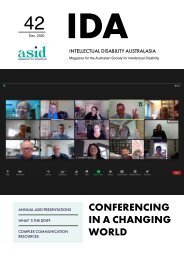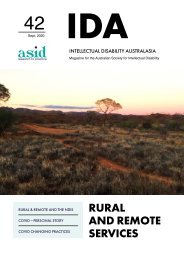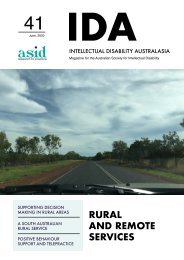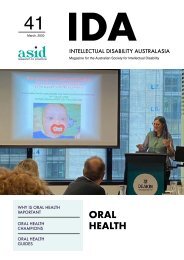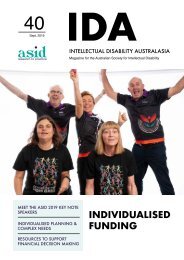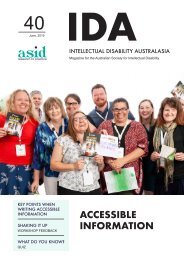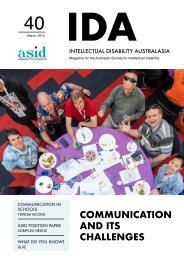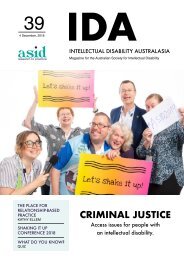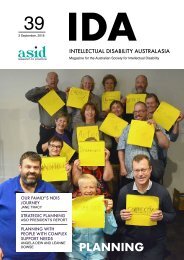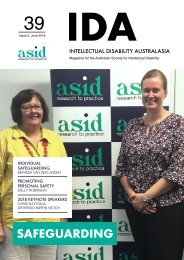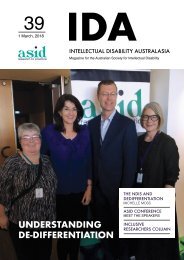IDA Vol 40 Issue 4 - ASID (Dec 2019)
You also want an ePaper? Increase the reach of your titles
YUMPU automatically turns print PDFs into web optimized ePapers that Google loves.
COMMUNITY RADIO PROVIDING OPPORTUNITIES FOR VOICE IN BRISBANE AND BEYOND<br />
The Only Human team<br />
supporting people with<br />
disability to have a voice<br />
on 4ZZZ in Brisbane every<br />
week. Left to right Renee,<br />
Steve, Kim, MC Chosen and<br />
Madonna in 2018<br />
that our stories are valuable and important, and developed skills for interviewing others. Kim and Ben<br />
provided the technical know-how to record and create a radio series, the Voiceability series, that won<br />
the Tony Staley Award for Excellence in Community Broadcasting in 2015 (Radio Today, 2015). During<br />
that collaboration, the importance of listening to and drawing out the stories of others to authentically<br />
represent people’s experiences became a crucial learning for all of us.<br />
Since that first project Kim, coordinating the Ability Radio Project and as a trainer with the Community<br />
Media Training Organisation, has facilitated many groups that train and develop the voice of people with<br />
intellectual, learning and other disabilities and connected to others nation-wide, leading to her doctoral<br />
research published in <strong>2019</strong>. Two groups ran monthly recording sessions in 2016-18 and were named by<br />
the participants: The People of The Air, of which Paul and Michael were members; and the Whoopeedo<br />
Crew Radio Group. Other projects facilitated by Kim included Women On the Edge (2018), Home Truths<br />
(<strong>2019</strong>) and concurrently a weekly program Only Human on 4ZZZ which has provided many opportunities<br />
for media participation for people with disability and disability organisations, both in the studio and<br />
through outreach. In 2018, ARP participated in the International Day for Persons with a Disability<br />
broadcast on the Community Media Network, which resulted in the stories of people with intellectual<br />
disabilities reaching a large audience of 5.9 million Australians who listen to community radio weekly<br />
(McNair Yellow Squares, <strong>2019</strong>).<br />
Listening as a purposeful activity has been the basis of the facilitated story-making in these media<br />
projects. This is a fundamental difference to usual media practice that tends to listen only to tell the<br />
story the media-maker wants to tell, which may not align with that of the ‘talent’ (what journalists often<br />
call their interviewees). The assumption is that a willingness to listen “enacts political equality, by seeing<br />
and listening to others as interdependent equals” (Bassel, 2017. p. 86). According to Thill (2018) in<br />
her examination of using listening for social justice, voice requires the powerful to listen in order to<br />
have an effect on decision-making. According to Thill (2018) relations of oppression succeed “partly<br />
by subjugating the voices and knowledge claims of particular people and groups”, and by employing a<br />
“deficit discourse” about marginalised groups that is maintained by their purposeful absence in dialogue<br />
<strong>Vol</strong> <strong>40</strong>, <strong>Issue</strong> 4, <strong>Dec</strong>ember <strong>2019</strong><br />
7




